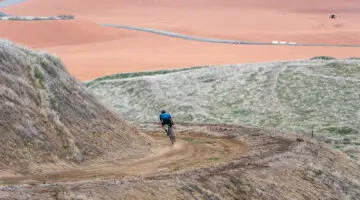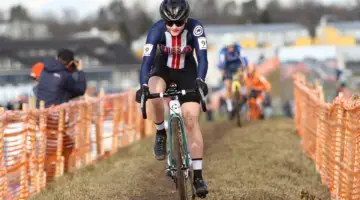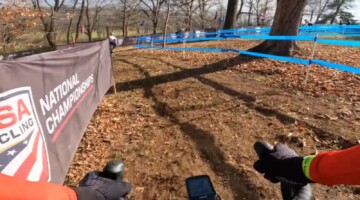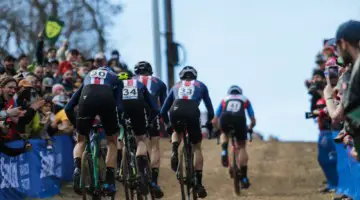During my interview with Tim Johnson at the Bogense World Championships, he mentioned that part of his work included hosting donors to the USA Cycling Foundation “Mud Fund.”
I had heard Johnson mention it once before, but admittedly did not really know what he was talking about. After some quick Googling, I learned that there is not much info available on the program.
The reason for that is it is a brand new initiative started by Johnson in his role as the Development Director of the USA Cycling Foundation. The Mud Fund gives donors the opportunity to give money to be used specifically for cyclocross programs.
The program launched this year with a small group of donors who combined to donate $100,000. Johnson said the money raised is already being put to use.
“First on the list was really hoping to see someone really championing cyclocross from within USA Cycling,” Johnson said. “That became the search for a Cyclocross Manager, and Jesse Anthony was eventually hired.”
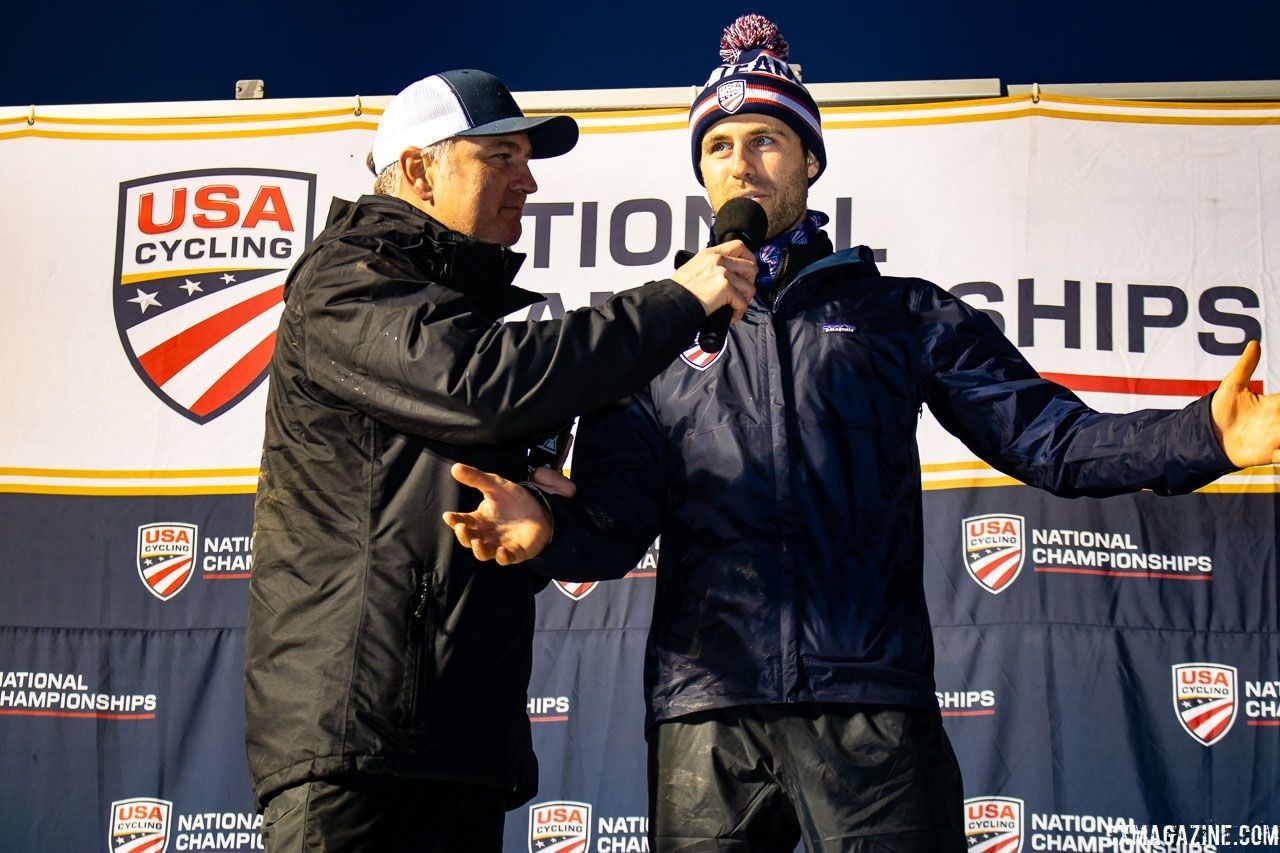
Jesse Anthony was introduced as the new Cyclocross Manager at the 2018 Cyclocross National Championships V2. Louisville, KY. © Cyclocross Magazine
With the USA Cycling Foundation separate from USA Cycling, Johnson said Anthony will be the point person for determining how money raised by the Mud Fund will be used. Another immediate use of Mud Fund funds we saw at Worlds was bringing Meredith Miller along to serve as a coach for the young women on Team USA.
Johnson said that after the successful launch, the Mud Fund will be expanding to include gifts of all sizes in the near future. Although Mud Fund webpage has not been launched yet, general information about the USA Cycling Foundation and how to contact Johnson can be found on the usacycling.org website.
I recently chatted with Johnson about the Mud Fund, his trip to Worlds and his work with the USA Cycling Foundation so far. You can read a transcript of our conversation below.
Interview: Tim Johnson on the Mud Fund, USAC Foundation Work
Cyclocross Magazine: Thanks for taking the time to chat. You made it home from Denmark okay?
Tim Johnson: It was awesome. I survived. What a week though. It was so awesome.
CXM: I guess I talked to you there and you seemed pretty excited. Did that continue through the rest of the weekend?
TJ: From the work side of things, with the Foundation, we had a great time. We did a really nice mix of experiencing the city of Copenhagen, the bike culture there, the infrastructure, looking at it from the perspective of people who live on the East Coast and in Chicago. Then that was combined with the sporting side of things.
It’s funny, we had a tour on Friday morning with one of my old teammates from Saturn, her name is Catherine Marsal, she was time trial podium finisher and Olympian from France who moved to Denmark 15 years ago. She took us around for a couple hours and showed us some of the sights all on bike. Then to go to the World Championships from there, we definitely had a really nice mix of things.
CXM: When we talked at Worlds, you alluded to the work you were doing with the USA Cycling Foundation there. Can you tell me more about what you were doing and what the program there looked like from your perspective?
TJ: What the USA Cycling Foundation has traditionally done is really centered around experiencing the Tour de France. That was bringing donors and interested parties to the Tour, spending a few days at a stage or two, but generally riding bikes in France in July. It’s one of the most special things you can do on a bike. It really combines the lifestyle with the sporting event. USA Cycling works with the ASO to get special packages that give us hospitality access, or even something more special that includes some of these mountain-top finishes.
That’s traditionally how our donors have seen cycling. In addition to that, it would be the Road World Championships, some Track World Cups, the Olympic games, Mountain Bike World Championships, but we haven’t really done much with cyclocross. So having that as one of the foundational parts of my career, I just really wanted to do that.
In conjunction with the launch of the Mud Fund and our increased interest in raising funds for cyclocross, hosting a couple of our donors at the World Championships was definitely on tap. It was a really fun thing to do.
First off, raising the money for the Mud Fund, that’s not what pays for our donors’ experience at Worlds. This is in addition to their contribution. Have no fear, money that actually comes in for the Mud Fund goes toward cyclocross.
We put together a little bit of a trip, and we actually went to one of the nicest restaurants in the world on Thursday night called Noma. It’s a really difficult place to get a table, and through a friend of a friend who is also a donor to USA Cycling, we got a table there and had a really nice dinner. We were able to talk bikes as much as we talked fermentation.
CXM: You’re a brewer now right? I read that story about the race in Quebec.
TJ: Well, not exactly. I enjoy tasting a good beer, for sure, and that restaurant Noma has really made its name around cuisine that has different fermentation ideas worked into it. Since we’ve been there, I’ve seen their book everywhere. They do a really good job there.
We got a chance to talk bikes and eat some great food. Then to go to the World Championships, we stayed in Odense. Driving from there to the race venue and getting a chance to do the VIP area thing, but also getting muddy and getting cold and windy and really remembering what cyclocross is all about was super fun.
I think the timing of the introduction of Fayetteville 2022 made it a really great time to be there. I think I mentioned it in a tweet that week, I remember when Louisville 2013 was announced what that meant for me as a racer. It gave me this immediate carrot to chase at the end of my career. I just knew how special of a moment that is for an athlete to go through, so that was really great to talk about with some of our guests.

Tim Johnson remained fully connected in Bogense. 2019 Cyclocross World Championships, Bogense, Denmark. © Taylor Kruse / Cyclocross Magazine
CXM: You mentioned the Mud Fund. Admittedly, after we talked in Bogense, I was looking up information on the Mud Fund, but I couldn’t find much about it. Can you share what it is and what that is all about?
TJ: The Mud Fund is really just a name given to cyclocross-specific funding. The Foundation raises money through three different vehicles. There are some memorial funds out there. Something a lot of folks will recognize is the Steve Tilford Memorial Fund. There’s another one that goes for high-performance grants.
Donors have different interests. You might be a life-long track rider and want to see track continue to develop in a way you’re interested in. Or you really want to see the country do something special in international competition, so your gift might include the stipulation that you’d love to see a Junior track program in a regional sense or in a national sense. Or I’d like to help out and build a roof over a velodrome, which is what happened in Colorado Springs.
In the case of cyclocross, we haven’t really had a focused fundraising campaign. Starting last year, we took the interest of one of our Cyclocross Committee members Thomas Nee, who’s also a cyclocross official, and kind of built on his interest. We started looking for other people out there who might be able to help support really pushing the sport forward. Using the input from the Cyclocross Committee, again, that’s made up of different stakeholders. You’ve got a race director, female and male athletes, team owner, promoter et cetera. All these different constituencies are represented on the Cyclocross Committee.
One of the things the Committee really wanted to see was the addition of funding toward the sport of cyclocross. With that funding, there would be these things that would come from that. First on the list was really hoping to see someone really championing cyclocross from within USA Cycling. That became the search for a Cyclocross Manager, and Jesse Anthony was eventually hired. I think his first week on the job was Cyclocross Nationals in Louisville, so he really jumped in at the deep end of the season and helped to facilitate the World Championships in Denmark.
What I’d like to do with the Mud Fund is continue to use that as our pivot point for the sport. Finding interested people who are generous and willing to support the sport and kind of develop a road map for what success looks like for the sport. That’s both domestic and international from the athletics side but also from the participatory side.
As someone who has been in the cyclocross world for a long time, I do wish for things to really grow and become something special. I’m happy to help however I can.
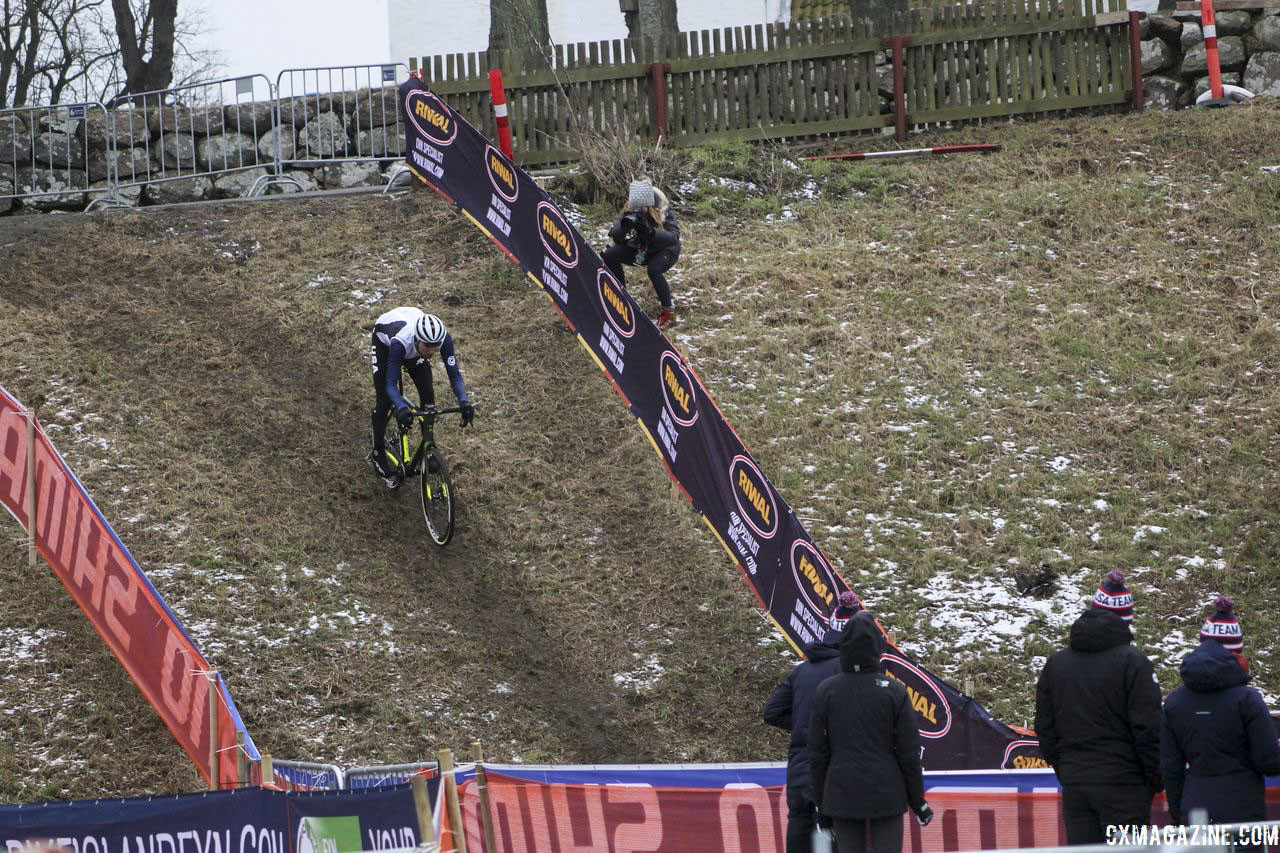
USA Cycling coaches were busy working with the young Team USA riders at Worlds. Bogense World Championships Course Preview. © Z. Schuster / Cyclocross Magazine
CXM: One of the things we hear from the cyclocross community is oh, we’re not an Olympic sport, so we don’t get funding. It sounds like you’re kind of saying that with the Mud Fund, in a way, we control our own destiny now. Donors can commit money specifically to cyclocross. Is that true?
TJ: Exactly. We have always controlled our own destiny. We are a community-driven sport. When I first started 20-something years ago, it was a smaller community, but it was the exact same thing. Everyone who gets involved in the sport wants to put their heart and soul into it. I think what something like this can do is give us something to stand on a little bit and really look forward to future planning and development of the sport as we wish to see it. It’s not that somebody else is in control of the sport. We in the community can do what we want with it.
CXM: Talking about Copenhagen and how you saw the different sides of cycling, do you have a sense of how you see the Mud Fund money being split between growing participation and funding Elite athletics?
TJ: Ultimately that’s not my call. The USA Cycling Foundation is separate from USA Cycling. We raise money to contribute to the athletic program and the organization as a whole. That’s across all disciplines. In this case, the person who’s really going to be in charge of a lot of that is Jesse Anthony. As he’s relearning who’s involved and the different aspects of cyclocross that are out there, he’s really prioritizing and building strategic plans for making the best moves.
They are limited funds, of course we’re always looking for more, but just having a few bucks in your pocket really does make a difference. As you mentioned, having these different coaches at an event like the World Championships is an example of that. Traditionally, we come from a very underfunded place. We have always wished we had more. We look at these other disciplines that are Olympic sports and wonder, why not us? This is a small step in trying to make that happen.
CXM: If I were a donor, the chance to go to Worlds would sound like an awesome opportunity. Do you have any plans to expand that side of things next year with the World Cups or something like that?
TJ: Yeah, exactly. A bucket list is going to Belgium and going to see a race like Zonhoven. Thomas Nee, who I mentioned, he went over there in December and took in a lot of those races. That’s exactly what this type of opportunity can be about. We want to push U.S. cyclocross forward, and if it means going to a place like Belgium or Copenhagen to experience it, then that’s awesome.
When I got a chance to do that from this side of the tape, it really is something special. It reminds me how cool it was to be a part of it when I was racing an how great the community is that makes cyclocross what it is. Walking around seeing the current racers out there going for medals and you see the nervousness in their faces and the power in their pedals.
At the same time, I looked over and saw Henrik Djernis, a multiple-time mountain bike world champion from Denmark. I looked at him from a couple of seats away, and I’m like, I’m pretty sure that’s him. I looked up Wikipedia just to be sure just to get an image, and yep it was him. So I walked over and introduced myself and chatted with him for a few minutes, I introduced him to a couple of our donors. It was a really fun way to kind of connect all of the dots.
CXM: You talked about being on the other side of the tape. In the community at large, there’s a lot of criticism that gets directed at USA Cycling. It was interesting seeing how hard everyone was working at Worlds and it seemed like everything went well. What has it been like for you in your position with USA Cycling, knowing the perspective athletes and others have when looking at USA Cycling?
TJ: I think a lot of that negativity or criticism is quickly dissipated when you see that work and the effort people who are actively involved in the different parts of the sport are putting into it. It really is enlightening, and it’s something you realize immediately when you’re involved.
I love hard conversations. I want to talk to someone who says, you know what, forget it, I don’t want anything to do with USA Cycling. I know what it’s like being on both sides, and from my perspective, it’s better to be engaged and try to make things better instead of just standing on the sidelines just throwing stones. It’s a position that I’m happy to be in, and I look forward to traveling around the country and being able to do these rides and races and have those conversations.
We’re better off together. There’s no question about it. I think the World Championships really shows that. You’ve got riders from different regions of the country who have this dream of representing their country on the start line. The road to get there really is long and it’s hard. It’s fraught with all these different questions that need to be answered and points that you need to get and money you need to spend. There are a million different things that go into each person who is on the start line.
The better we all work together, the better the chances are that rider is going to have a great race. When we have the World Championships coming to the U.S. in a couple years, it’s important we have that put together in the right way. An athlete who is just trying to do their best in the race is the person who we should be supporting the most. No large group of people spread across a country the size of ours is really going to get along perfectly every single day, but I think we can really rally behind the riders who are representing us.
CXM: So basically you’re saying we can @ you on Twitter with our complaints?
TJ: Anytime. The first word of advice I had for Jesse was, hey man, get ready, because there are a lot of people with a pent up interest in trying to tell you what’s wrong. But he’s doing a great job. I think he’s uniquely situated to tackle some of those more difficult questions. He’s been in it deep enough, but also separate from it to look at it from a bit of an outsider’s perspective. He can look at it strategically and figure out how to phase in new concepts but also look for long-term success.
CXM: You come from an athletic background, and I’ve been impressed by your, I guess, hustle. During your career you were able to form partnerships with companies like Red Bull and stuff. How has it been going now that you’re doing it full time?
TJ: It’s been great. I like the fact that my job is spread among different areas of cycling. It’s not just road, it’s not just cyclocross. One of the fun things about my job is I get to talk about bikes in general, and I also get the chance to talk to people who have not been exposed to different ways of riding. They might have a really clear interest or passion, but because of work or family or starting riding as an adult, they haven’t been exposed to the different sides of cycling.
I’ve ridden everything and really enjoy everything, so I love being that Swiss Army Knife in cycling for them. To share those different interests and the different ways we can all get on a bike.
Fundraising is definitely and interesting and difficult job. I want the best for my sport, and I want the best portrayal of my sport. I want to make good decisions for everyone so my job is easier. I want something to talk about with our donors that s really positive. I want something that’s going to be growing our community and reaching out to people who aren’t on bikes yet. I think that kind of outlook is going to suit me well on the job, and I think it’s been received pretty well so far.
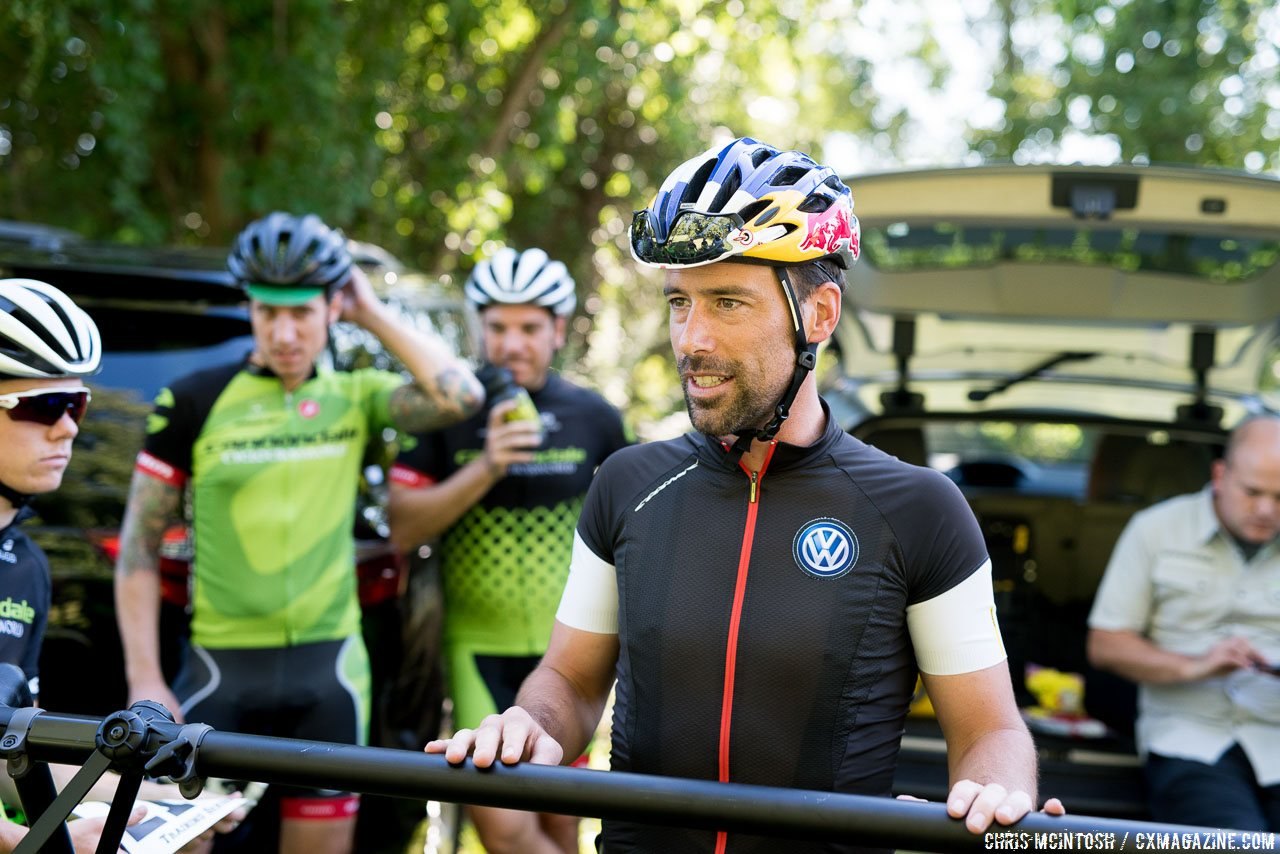
As an athlete, Tim Johnson had good relationships with sponsors. © Chris McIntosh / Cyclocross Magazine
CXM: I like the Swiss Army Knife description. I was thinking back to our conversation that we had among the boats at Worlds after the first day of racing at Worlds, and you look at, for example, our U23 Men who had a number of great rides, but then when we make that transition to the Elites, the going gets much tougher. Can USA Cycling help ensure that they’ll continue to have success?
TJ: I think of someone like Emma White in this case. You’ve got someone who grew up around the sport. It was her favorite discipline because she could go to events with her family, compete on her own but also cheer on her brothers. It gave her a chance to show her talent in cycling. She’s really opened up some new doors and is now training for the Tokyo Games with the pursuit team. In the best case scenario, we just have more Emma Whites. We have more of those athletes to choose from. Logan Owen is another example. We need more Logan Owens.
However they come into our ecosystem, they come into it and they’re nurtured and cultivated and allowed to pursue different disciplines. But in the end, they’re just a part of this cycling world. I think we’ve always wanted success internationally, and we’re doing it with a relatively small pool of athletes. When we talk about fundraising, it’s about dollars and cents. The more money we have, then theoretically, the more athletes we can help through this process and put in this pipeline.
Cyclocross, traditionally, is a really great entrance into the sport of cycling. It allows for a lower barrier of entry. You don’t have to start it at 12 years old, you can get into it in your 20s and see some success. Look at Rebecca Fahringer at the World Championships after not picking up the sport until later in life. When I look to how we perform as Elites, I just want a larger group of athletes who are just trying to get there and not make it so elite. We should really have 20 athletes who are trying to make a team of 5 to appear at the World Championships in the colors of their country.
CXM: It’s interesting you mentioned Rebecca because we have a story about her coming soon. It’s been great to see how successful she has been after picking up the sport late, or kind of late, in her 20s.
TJ: Another great example is Evelyn Stevens. She has the exact same story. Her first race was actually a cyclocross race. She just happened to go onto the road and is now representing us at the Olympics, but that was all in her mid-20s. That road has been followed before, so in some ways she’s not necessarily a pioneer, but we need to make things much easier for athletes like that who have a skill set and physical ability to do that sport to come onto our radar.
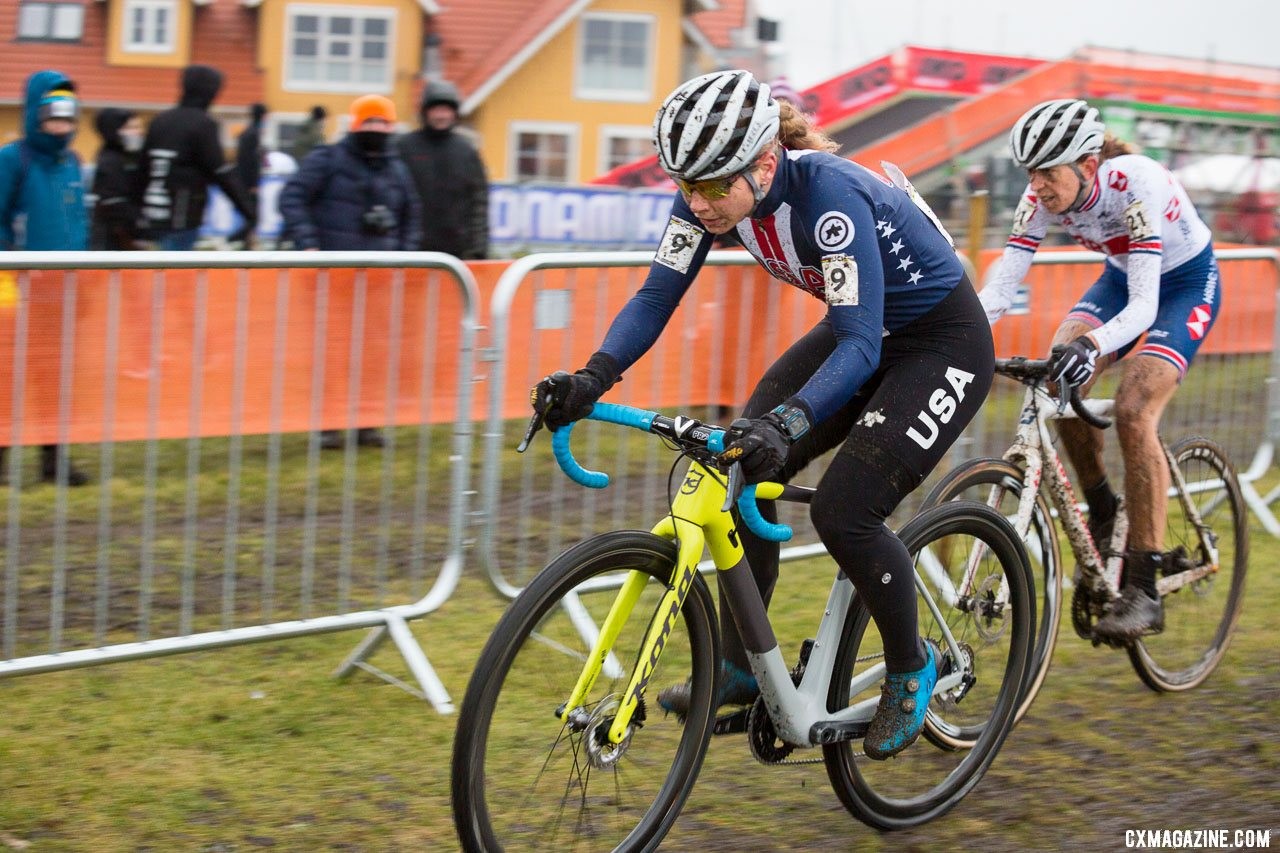
Rebecca Fahringer has been very successful after picking up cyclocross in her 20s. Elite Women, 2019 Cyclocross World Championships, Bogense, Denmark. © K. Keeler / Cyclocross Magazine
CXM: So if I’m an aspiring athlete, can I @ you for training advice as well?
TJ: I’ll immediately reply with someone else’s handle. I get those questions a lot, actually. That’s one of the fun parts of the job, you know dropping into a bar in Copenhagen on Friday before heading to the race, we ran into a crew from Minneapolis, Nick Carter’s parents and friends who were there to watch him compete at Worlds. To be able to chat for a few minutes about what it means to be a Junior lining up at the Worlds and how best to make success happen in his future was really cool. That’s definitely one of my favorite parts of my job.
CXM: I think it’s cool that you’ve stayed involved in the sport with the Cannondale crew and now USA Cycling. You were finishing up your career when I got my start, and you always seemed to be having a good time and I think it’s cool that you’re still an advocate for the sport and all that.
TJ: Seeing some of those photos from Louisville 2013 recently really brought back a lot of what it meant to be in a home-country World Championships. That was something that was really a highlight of my career. Looking at those younger riders who were at Worlds this year, seeing the camaraderie and the attitude of the team as a whole was great. The results weren’t necessarily there, from the perspective of getting top fives and medals, but I think that kind of deeper attitude and deeper team vibe sets us up well for Fayetteville in 2022.
It’s going to be a team effort for all of us to get there. We want to see Katie [Clouse] and Clara [Honsinger] getting cheered on in the U23 Women’s race, and little Maddie [Munro] as a Junior. We want all of those kids to kind of benefit from the shared experience they had. I remember what it was like lining up for the World Championships in Louisville and looking over and seeing tons of familiar faces in the crowd and knowing they all wanted me to have a good race. It was really cool.
CXM: One thing that’s been cool to see is riders becoming friends having these competitive friendships, and we also saw Little Kaitie and Stephen and Curtis and Kerry going to Europe and riding together. Do you see future programs similar to Montana Cross Camp being part of the future of USA Cycling?
TJ: Absolutely. One of the things that has been a fairly common criticism of how we push the sport forward is are we paying plane tickets to United or is there some other way. Do we pay just hard costs, or is it about creating opportunity for development in different places and ways.
I just got off the phone with the Cyclocross Committee as an observer and someone who can help trigger discussion among that group, and that’s definitely on the table. That’s something people are working toward. My work with raising money at the Foundation, I just want to create opportunities like that, whether it’s in cyclocross or across the other disciplines.
CXM: Awesome. Thank you for your time.
TJ: No worries.
CXM: I’m looking forward to seeing you at the Trek CX Cup Legends Race again when you get in a fight with my teammate the pickle.
TJ: *Laughs* That was awesome. He was dropping those pickles, and I was like what am I going to do, I’m getting hit with this one-pound pickle. It was dangerous man. I needed safety glasses.
CXM: That’s kind of how Travis rolls. I had a picture of you and the pickle getting into it.
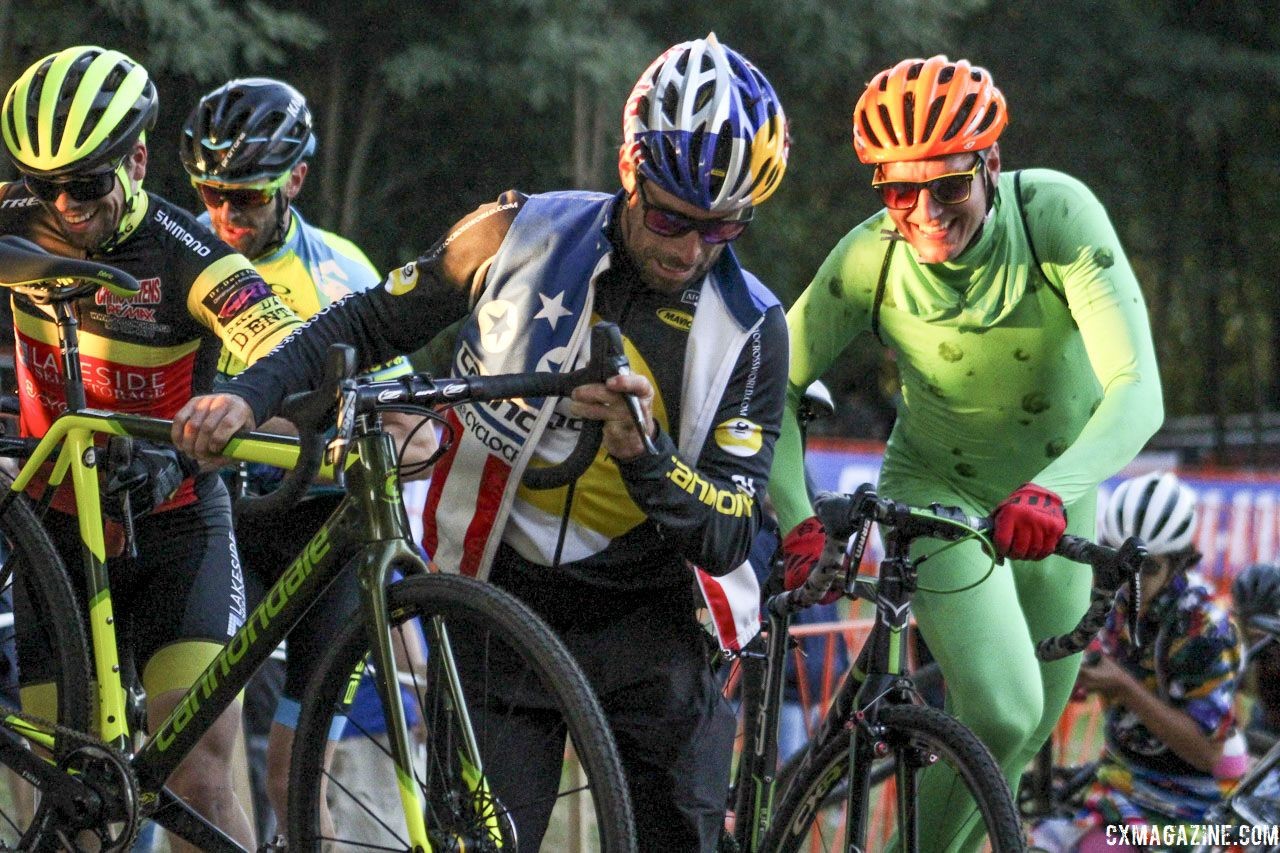
Tim Johnson and the pickle got a little rowdy in the Legends race at the Trek CX Cup. © Z. Schuster / Cyclocross Magazine
TJ: If it makes him feel any better, you can let him I know I totally slammed into Sven. He was totally shocked, but when he saw it was me, he just started laughing. That whole event was awesome. Chad Brown at Trek, if you look at people who have a real interest in developing the sport and keeping its core values at heart, Chad is exactly that kind of person. That was one of my most fun weekends of the year.
CXM: Chad’s the best. Thanks again.
TJ: You bet. Thanks.
Featured image: Jeff Curtes







